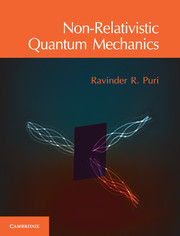Book contents
- Frontmatter
- Dedication
- Contents
- Preface
- 1 History of Quantum Mechanics
- 2 Vectors and Operators
- 3 Finite Dimensional Spaces
- 4 Function Space
- 5 Postulates of Quantum Mechanics
- 6 Density Operator
- 7 Measurement Postulate and Paradoxes of Quantum Mechanics
- 8 Position and Momentum Representations
- 9 Schrödinger Equation in One Dimension
- 10 One-Dimensional Piecewise Constant Potentials
- 11 One-Dimensional Exactly Solvable Continuous Potentials
- 12 Partially and Completely Periodic Potentials
- 13 Harmonic Oscillator
- 14 Three-Dimensional Central Potentials
- 15 Symmetry in Quantum Mechanics
- 16 Quantum Theory of Angular Momentum
- 17 Approximation Methods
- 18 Entanglement and Local Hidden Variable Theory
- Appendices
- References
- Bibliography
- Index
1 - History of Quantum Mechanics
Published online by Cambridge University Press: 16 July 2025
- Frontmatter
- Dedication
- Contents
- Preface
- 1 History of Quantum Mechanics
- 2 Vectors and Operators
- 3 Finite Dimensional Spaces
- 4 Function Space
- 5 Postulates of Quantum Mechanics
- 6 Density Operator
- 7 Measurement Postulate and Paradoxes of Quantum Mechanics
- 8 Position and Momentum Representations
- 9 Schrödinger Equation in One Dimension
- 10 One-Dimensional Piecewise Constant Potentials
- 11 One-Dimensional Exactly Solvable Continuous Potentials
- 12 Partially and Completely Periodic Potentials
- 13 Harmonic Oscillator
- 14 Three-Dimensional Central Potentials
- 15 Symmetry in Quantum Mechanics
- 16 Quantum Theory of Angular Momentum
- 17 Approximation Methods
- 18 Entanglement and Local Hidden Variable Theory
- Appendices
- References
- Bibliography
- Index
Summary
History is the most fundamental science, for there is no human knowledge which cannot lose its scientific character when men forget the conditions under which it originated, the questions it answered, and the functions it was created to serve.Astudent of quantum mechanics can ignore these words of Benjamin Farrington, often quoted by Schrödinger [1], only at his own peril. For, without their historical perspective, the counter-intuitive nature of the physical laws of the quantum theory may appear to be mystic. Indeed, the laws of quantum mechanics exhibit their distinctive character on a scale which is out of reach of our everyday experience. This is in contrast with the intuitive appeal of the Newton's laws and their conformity with our common experience. However, the inability of the then known theories, referred to now as the classical theories, to explain certain physical phenomena led to the search for a new theory. It culminated with the advent of the quantum theory. The true scientific character of the quantum theory cannot be appreciated without understanding the conditions under which it originated, the questions it answered, and the functions it was created to serve. Such an understanding can even motivate one to ponder whether there can be any other description of the laws of nature which is free from the conceptual and philosophical inconsistencies which are often pointed out in the present-day quantum theory. This chapter outlines brie_y how the ideas leading to the birth of quantum mechanics took shape.
Information
- Type
- Chapter
- Information
- Non-Relativistic Quantum Mechanics , pp. 1 - 30Publisher: Cambridge University PressPrint publication year: 2017
